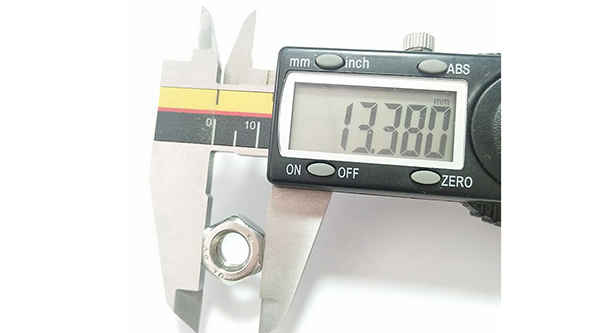What is the tolerance range of precision screws?
What is the tolerance range of precision screws?
Service Hotline
+86760-8787 8587We have more than ten years of experience in screw industry production, the main products are: pure titanium screw titanium nut, GB39 square nut, galvanized casting nut, flat head hexagon socket head screw, external hexagon combination bolt, American standard gasket, knurled cone nut Conical nuts, Huasi enlarged flat washers, B1821 square head bolts, carbon steel GB5782 screws, nylon concave hole countersunk hole insulation, 2809 bolts, hexagon socket expansion nail screws, large hexagon head bolts, red steel paper flat washers, etc. Due to the different materials and specifications of the products, the prices are also different, if necessary, please contact us.


The purpose of Guangdong Yueluo Hardware Industry Co., Ltd. is to provide a flat gasket that improves the lubrication performance of the contact surface and reduces the friction of the contact surface. Yueluo is implemented through the following technical solutions: a flat gasket with straight upper and lower end faces, characterized in that: the upper and lower end faces are dotted with pits, the pits are spherical pits, and the pit diameter is 2-3mm , the pit depth is between 0.5-lmm. The bottoms of some of the pits are provided with through holes penetrating the upper and lower end faces, and the diameter of the through holes is not greater than 0.5mm. The flat gaskets provided by Yueluo have pits with reasonable design parameters on the upper and lower end faces of the flat gaskets. The pits can store oil, so the lubrication of the contact surfaces of the gaskets can be well improved. It can effectively reduce the friction of the contact surface of the gasket and reduce the failure rate; in addition, the design of the through hole enables a smooth oil passage between the upper and lower end faces of the gasket, ensuring that the upper and lower end faces can be well lubricated.

The slotted nut needs to be fixed with a cotter pin through the slot of the slotted nut, and the cotter pin must pass through the middle of the screw to fix the slotted nut. Usually, both ends of the screw need to be drilled, the diameter of the hole and the size of the slotted nut. The width and depth of the slot determine the size of the cotter pin. When the selected screw, cotter pin and slotted nut are relatively matched, the nut is fixed by the screw, so that the slotted nut does not loosen. This hexagonal slotted nut has the characteristics of high strength and is not easy to loosen when subjected to vibration. It is mainly used in occasions with vibration and shock, such as front and rear axles of automobiles, lifting equipment, presses and die-casting machines.


Half round head rivets are mainly used for riveting occasions with large lateral loads, and are the most widely used. Flat cone head rivets are often used in riveting occasions with strong corrosion such as ship hulls, boiler water tanks, etc. Countersunk head and 1200 countersunk head rivets are mainly used for riveting occasions where the surface must be smooth and the load is not large. Half countersunk head and 1200 half countersunk head rivets are mainly used for riveting occasions where the surface must be smooth and the load is not large. Flat head rivets are used for riveting occasions with general load. Flat head and flat head rivets are mainly used for riveting of metal sheets or non-metallic materials such as leather, canvas and wood. Large flat head rivets are mainly used for riveting of non-metallic materials. Semi-hollow rivets are mainly used for riveting occasions with small loads. Headless rivets are mainly used for riveting of non-metallic materials. Hollow rivets are light in weight and weak in head, and are used for riveting of non-metallic materials with small loads. Tubular rivets are used for riveting of non-metallic materials without load. Nameplate rivets are mainly used for riveting nameplates on machines and equipment.

Earless retaining ring (known as Constant Section Rings abroad) is also called constant section retaining ring, because the cross section is equal, and there is no ear part protruding from the traditional stamping retaining ring, so it is called earless retaining ring. Earless retaining ring and spiral retaining ring have similarities in production, processing and use characteristics. They are both flattened and wound by steel wire. After heat treatment and surface treatment, they have good elasticity and toughness. Earless retaining ring is divided into two types: shaft use and hole use, and there are various forms of tail ends to choose from. The application of earless retaining ring is the same as that of traditional C-type retaining ring, which is widely used in hydraulic parts assembly, valves, instruments, various lock core components, needle roller bearings, pulleys, connectors, quick connectors and other mechanical assemblies.

The above content is uploaded by Yueluo or the Internet. If there is any copyright issue, please contact [email protected].

What is the tolerance range of precision screws?

How to choose the right stainless steel screw manufacturer?

Why is there an R angle under the head of the hexagon head s...

We have more than ten years of production experience in the ...

We have more than ten years of production experience in the ...

We have more than ten years of experience in screw industry ...

We have more than ten years of experience in screw industry ...